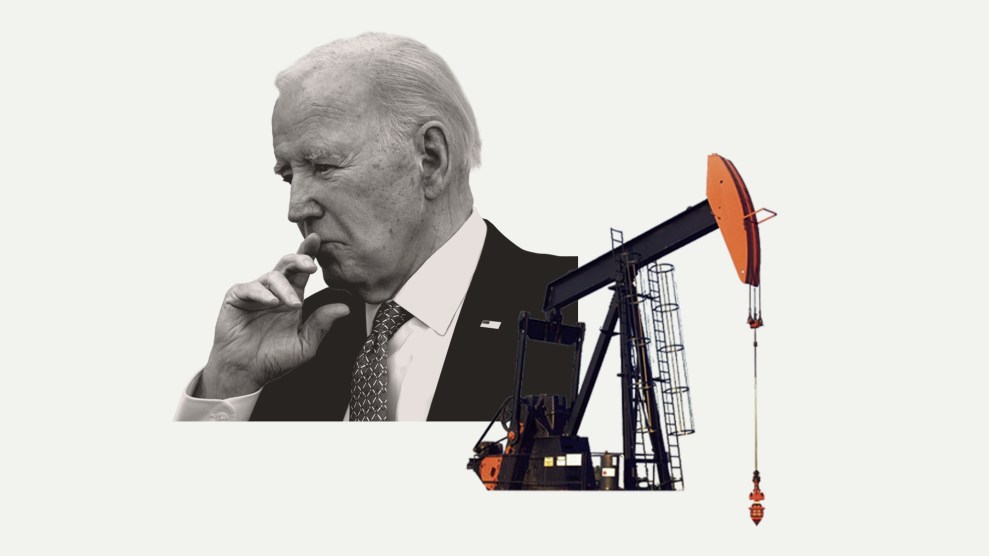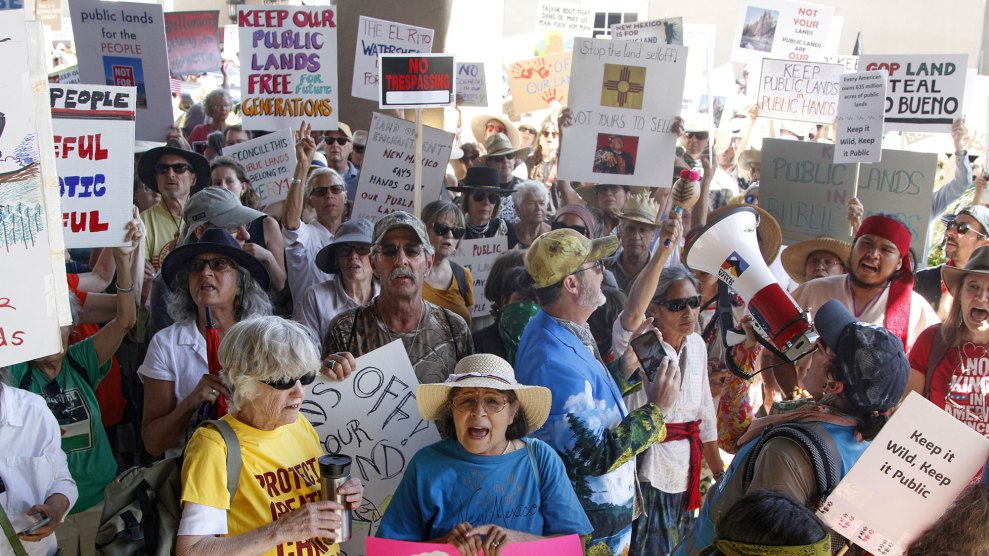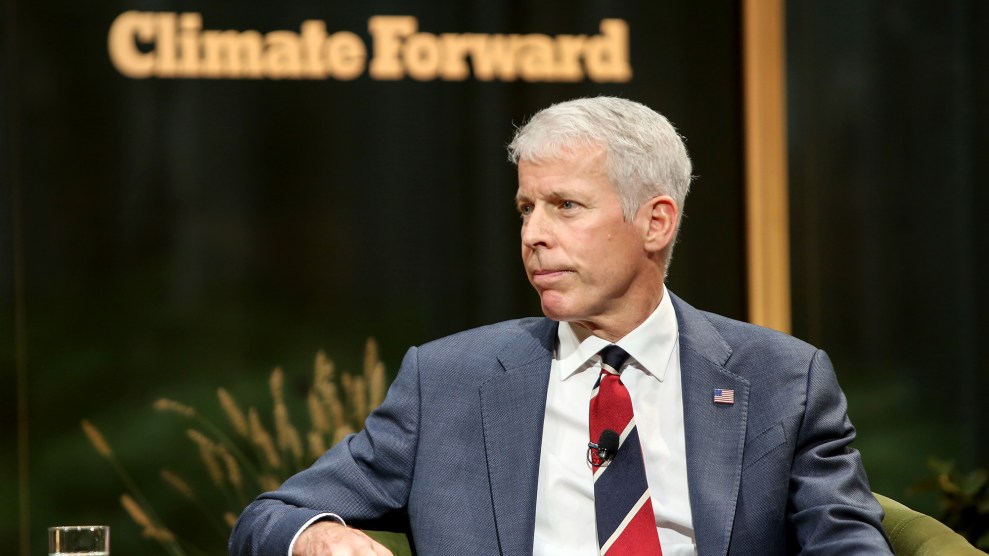
Mother Jones illustration; Chris Kleponis/CNP/ZUMA; Doe/Planet Pix/ZUMA
At a Glasgow climate summit in 2021, the Biden administration offered a commitment to the world: The United States would stop the public financing of oil and gas projects. There would be no more American tax dollars for new natural gas pipelines or wells, the White House said
The pledge drew praise from climate change activists. But there was one big problem—it was an empty promise.
In the years since Glasgow, the US has continued to finance fossil fuel projects around the world. The latest example came Thursday, when the US Export-Import Bank finalized a plan to guarantee part of the financing for a $4.2 billion revitalization of natural gas production in the nation of Bahrain. The move—which comes just weeks after the Biden administration triumphantly announced a freeze on the domestic development of new projects designed to export liquified natural gas—will include the construction of dozens of gas wells and 450 new oil wells. It will bring online as much as 5.2 trillion cubic feet of natural gas, or about five years of additional gas production at Bahrain’s current levels.
The ExIm Bank was established by FDR in 1934 to goose exports by lending money to foreign customers who want to buy American goods. While it’s backed the US treasury, it has actually returned a profit over the last two decades—a fact that tends to insulate it from political oversight. In recent years, however, it has become something of a target for fiscal conservatives, drawing fire from tea party-aligned Republicans during the Obama years. It was largely dormant during the Trump administration, before being revived after Biden took office.
Officially, the bank is an independent agency within the executive branch, but it has traditionally been largely compliant with broader US policy—reliably stepping in to finance sales of planes and trucks to Cold War allies and support US manufacturing jobs, for example. That’s what makes the Bahrain deal and other recent oil and gas projects greenlit by the bank so galling to clean energy advocates. And there’s no end in sight. Among the fossil fuel initiatives on the shortlist for ExIm Bank consideration later this year is a liquified natural gas project in Papua New Guinea. That venture, which has struggled to find financial support from European banks, could yield as much as 11 trillion cubic feet of gas if ExIm decides to sign on.
According to the ExIm Bank’s own annual report, of the $34 billion in outstanding obligations currently on its books, $8.1 billion is for oil and gas projects, including both direct financing and loan guarantees. That number has dropped from $10.8 billion in 2021—the year the Biden Administration made its Glasgow commitment—but it still represents more than a quarter of the bank’s total financial exposure. The bank has touted the fact that last year it financed $950 million in green energy or climate-friendly projects (almost all of that was for a single project to build giant solar power plants in Angola), but a tally by one environmental group found that in 2023, the bank also had a hand in financing at least $1.7 billion in new oil and gas projects.
This direct contradiction of clearly articulated administration policy is possible because because of the bank’s nominal independence. It makes its own decisions and evaluates its own deals—it’s supposed to conduct transactions that support the American economy, free from political interference.
In practice, however, the administration has quite a bit of sway over the bank and its priorities. The president appoints the director and the governing board, with the approval of the Senate. Currently, the bank’s president and chair is Reta Jo Lewis, a longtime Democratic operative and reliable Biden ally who worked in the Clinton and Obama White Houses. Publicly, the Biden administration has sent signals recently that it is not happy with its own bank. Last years, when the bank approved a loan to expand an oil project in Indonesia, a spokesperson for Biden’s National Security Council told Bloomberg News that ExIm had “made an independent decision to approve the loan under its authorities and its decision does not reflect administration policy.” While the statement was a notable shot across the bow from one part of the Biden administration to another, it also was not accompanied by any further action.
For critics, the recently approved Bahrain project is an excruciating example of the bank’s refusal to adhere to the administration’s stated policies on financing fossil fuel projects. Defenders of the bank will point out that the administration’s promise in Glasgow was just that—a promise, not a law. The bank has defended its oil and gas investments, pointing to the law that prohibits it from discriminating against projects based on industry.
The project aims to reinvigorate Bahrain’s largest oil and gas field, one that has generated enormous profits for decades, but which seems to be starting to fade. Financing would be a huge boost for the tiny island kingdom—a loyal ally in a volatile region. Bahrain isn’t just an economic and energy partner, it’s also home to a massive US military base that houses the Navy’s Central Command and Fifth Fleet.
Rep. Jared Huffman, a Democratic congressman from California, has sponsored legislation to ban taxpayer financing of oil and gas projects by government-backed international financial institutions, including the ExIm Bank, the US International Development Finance Corporation, and the US Trade and Development Agency. In a recent interview, he told Mother Jones that taxpayer support for a project like Bahrain’s is outrageous on a variety of levels, starting with its environmental impact. Natural gas accounts for more than one-third of all US greenhouse emissions—both in the form of methane that leaks from natural gas infrastructure and carbon dioxide produced by burning gas for energy.
“It’s a methane bomb,” he says. “Not only does it contravene our climate policies and everything we say… it’s going to have a huge impact on the climate crisis—it’s going to expand Bahrain’s natural gas production massively, and that means decades of addiction for the countries who purchase this natural gas.”
And for that reason, the Bahrain deal—along with the other oil and gas projects the ExIm Bank is involved with—will damage America’s ability to negotiate on climate going forward, Huffman says.
“Our credibility—our prestige—when we get to the next climate summit and ask the world to take us seriously is hurt,“ he explains. “Things like this make that a lot harder.”
Sen. Jeff Merkley, an Oregon Democrat working with Huffman on the bill, told Mother Jones that the bank had “gone rogue” with its Bahrain decision.
“Its plan to support drilling hundreds of new oil and gas wells in Bahrain is the latest example in series of decisions that damage our climate credibility on the international stage,” Merkley said in a statement. “The EXIM Bank should be supporting our fight against climate chaos, not undermining it.”
The borrower in the case of the Bahrain project is Tatweer Petroleum, which is owned and operated by the Bahraini government, which upsets Huffman even more. “They don’t need taxpayer support,” he scoffs. “It’s preposterous to think that taxpayer funding is needed by these massive oil and gas interests or by Bahrain.”
Ostensibly, the project qualifies for ExIm Bank support because the oil field services company SLB (once known as Schulmberger Brothers), which has significant operations in Texas, would be a major supplier of materials.
On Thursday, the bank announced it was guaranteeing $500 million in loans for the project, which it claimed will support as many as 2,100 jobs in Texas. Even though the bank is not putting actual taxpayer money on the table unless the loan goes bad, critics say the financial particulars are not as important as simply having the US government’s endorsement.
“The much bigger impact is once the Export Import Bank is in, it allows for private banks to come in because they know the U.S. is going to be take the large share of the risk,” says Kate DeAngelis, senior international finance program manager at Friends of the Earth. “In reality, it brings billions—tens of billions—of dollars to a project and that project is able to go forward in which it wouldn’t otherwise.”
At a time when Wall Street and the traditional sources of financing for big oil and gas projects are being challenged to reevaluate the consequences—and potentially the rising financial risks—of investing in fossil fuels, ExIm’s involvement is a stamp of approval that signals to other financiers that such a project is still very much welcomed by the United States.
The bank has defended its recent decisions by noting that its job is to fairly consider whatever projects come before it. “EXIM seeks to align with the Administration’s climate agenda while still complying with EXIM’s statutory requirements, including the…prohibition against discrimination based solely on industry, sector or business, and its mission to support US jobs,” a senior bank official told Mother Jones.
But critics like DeAngelis say that, in addition to contravening the administration’s own policies on public money for oil and gas projects, a lot of the investments the ExIm Bank has been making just aren’t smart economically or from a national-interest perspective.
“They just have a huge amount of risk—why would ExIm pick those projects?“ DeAngelis says. “I’m baffled about that. And from a different perspective, why is the US government getting involved with the Bahraini government?”
All of this raises the question of how the ExIm Bank makes its decisions. Some see it as a matter of inertia—the bank has long been supportive of fossil fuels. There’s a pattern of behavior that favors the known, observes Collin Rees, the US program director for the activist group Oil Change International.
Companies that lobby the bank are required to file disclosures, though those are rather thin on details.The lead private financier on the Bahrain project, for example, is Wall Street mega-bank JPMorgan—which spent $3.5 million lobbying in Washington last year, though it’s unclear how much of that was spent to influence ExIm.
“It’s a complex system, it’s difficult to apply for these things, certain companies come up again and again,” he says. “These certain enterprises that have devoted time to learning the system but also see it as a reliable source.”
As Huffman puts it, “The system has become hardwired for fossil fuel.” There’s a longstanding cozy relationship between oil and gas interests and the US government, and fossil fuels are still a great geopolitical tool, he says.
“I think we’re trying to outflank China and others to develop fossil fuel in Bahrain—it’s about powerful US companies and a rich Middle Eastern nation,” Huffman says. “And there’s just this default setting of more fossil fuel forever.”
Instead, Huffman argues, the US should be devoting its financial resources to competing with China on clean energy.
But redirecting a massive financial institution is easier said than done. Aside from placing a loyalist at the top of the bank, Biden also issued an executive order in early 2021 instructing agencies to promote climate-friendly financing. And he created a “climate council” at the bank, to offer advice on how to support clean energy jobs and exports. But that council appears to have no actual role in the process of deciding what loans will go forward, and recently two members resigned over their lack of input.
The main power Congress can exert over the bank is in its reauthorization—a requirement that Congress reapprove its existence every few years. The next reauthorization will be in 2026 and will likely involve major opposition from right-wing lawmakers, who see the bank as a boondoggle. While many Democrats are likely sympathetic to the climate arguments, they may be reluctant to stake a lot of political capital on a fight that aligns them with the likes of Ted Cruz.
Huffman, however, wants to see a total overhaul of the ExIm Bank, starting at the top.
“We need new leadership for the bank,” he says. “Maybe they should have to pass a reading test where the executive order on climate is presented to them, and we should see if they’ve read it.”













